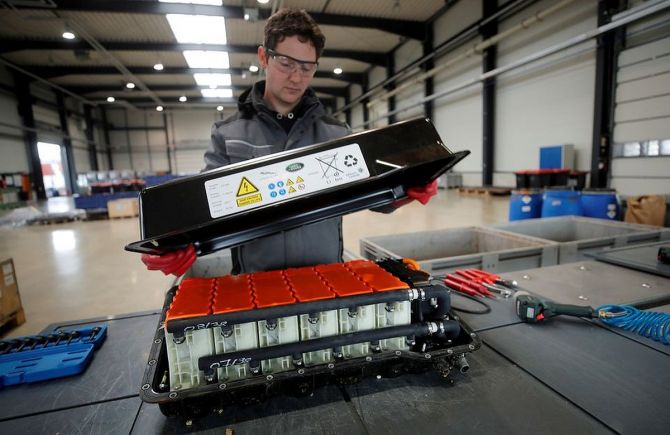To ramp up domestic battery manufacturing capacity and reduce the dependence on imports, the government has initiated talks with a few lithium-rich countries to supply the mineral to Indian companies, industry sources informed Business Standard.

The Ministry of External Affairs (MEA) held a meeting with the ambassadors of countries, including Argentina, Chile, and Bolivia, among others, to put forth its request.
“The government can facilitate country-level issues which private companies cannot address at their level.
"This will help speed up processes,” said a person in the know.
India has an estimated requirement of about 80,000-140,000 tonnes of lithium — ‘white gold’ for electric vehicles (EVs) — in the next two to three years.
The MEA did not respond to the queries sent by Business Standard on Wednesday.
Akshat Singhal, founder, Log9 Materials, which makes batteries for EVs and will also have a cell manufacturing plant starting production by March 2023, says while the government’s step is “commendable, the approach is still passive”.
Given the growing strategic importance of lithium, a stockpile is required to be created.
The challenge, according to Singhal, is that most of the other EV markets like the US, China, and Europe, to name a few, already have active manufacturing of lithium ion (Li-ion) batteries and they can immediately use the lithium.
However, it’s not the same scenario in India.
Considering India doesn’t have active manufacturing, all it can do at this point is to make promises and speak about future sourcing commitments when manufacturing goes on-stream.
“Why will countries with lithium reserves pay heed to us when they already have an ecosystem for battery manufacturing up and running?” asks Singhal.
To address that challenge, the government needs to secure supplies and streamline the procurement of material, commit capital, and create a stockpile.
The government can sell the material to companies that need it when the manufacturing goes on-stream.
“We need to give enough confidence to these countries that India is serious about setting up a supply chain.
"The only way it can be done is to put your money where your mouth is,” says Singhal.
As countries explore alternatives to fossil fuels, the demand for lithium is expected to see an increase.
The Centre last year launched the National Programme on Advanced Chemistry Cell Battery Storage to reduce import dependence.
The tiny advanced chemistry cells, which are used in Li-ion batteries, will play a big role in cutting short the world’s dependence on fossil fuels.
A production-linked incentive (PLI) scheme for potential manufacturers has also seen participation from several companies.
Four companies, including Reliance New Energy Solar, Ola Electric Mobility, Hyundai Global Motors, and Rajesh Exports, were selected last month to receive incentives under the government’s Rs 18,100-crore PLI.
They will have to set up the facility in two years.
India is emerging as one of the big markets for EVs and will need locally manufactured cells to feed the growing demand for EVs, says Samrath Kochar, founder and chief executive officer of Trontek, one of the largest manufacturers of EV batteries.
“It’s a step in the right direction and will help us become self-reliant on lithium.
"A government-to-government talk will help companies looking to manufacture cells locally to enter into long-term contracts with suppliers,” says Kochar.
Electric two-wheeler penetration in overall two-wheeler sales is expected to account for a minimum of 60 per cent by 2030.
For electric three-wheelers, four-wheelers, and heavy commercial vehicles, it is likely to be 40 per cent, 10 per cent, and 5 per cent, respectively, according to McKinsey & Company.
Almost the entire EV industry in India currently imports Li-ion cells needed for battery manufacturing.
“This move from the Indian government will help remove that dependency,” says Arun Sreyas Reddy, co-founder, RACEnergy.
RACEnergy specialises in building some of the highest energy density battery packs in the world, he claims.
This requires high-performance cells.
“With this move, more players will feel incentivised to start in-house manufacturing of cells and move forward in producing some of the best cells in the world,” he adds.












 © 2025
© 2025